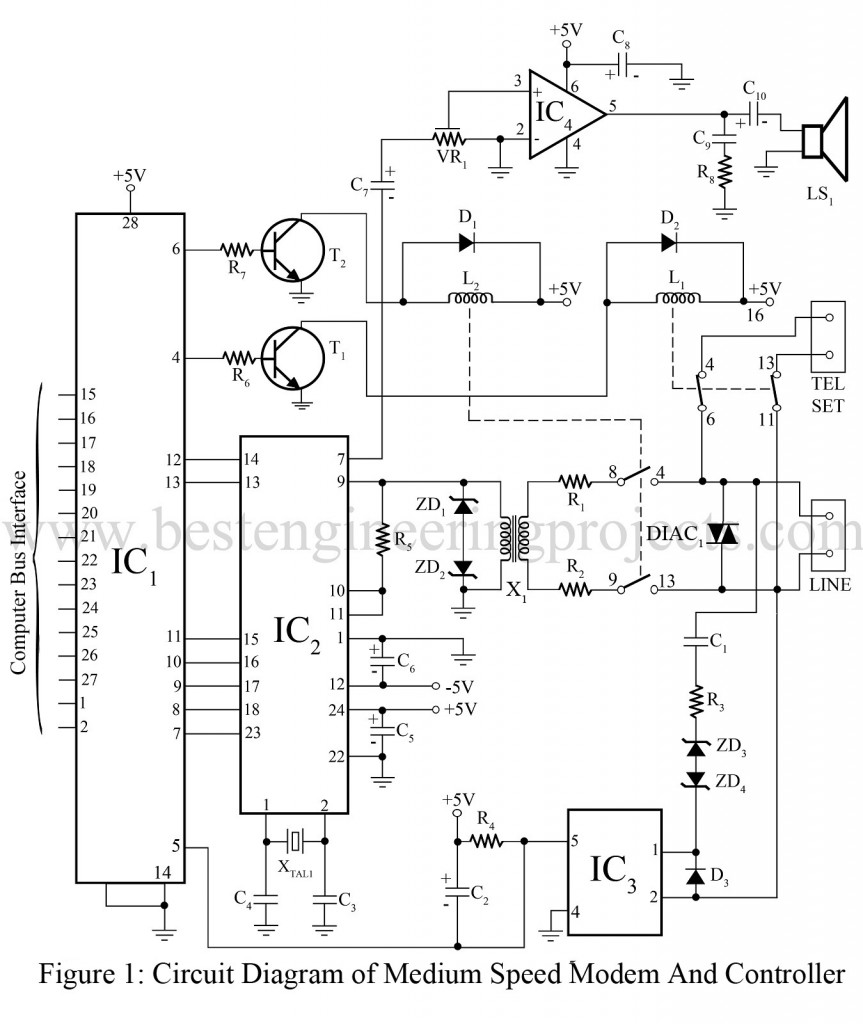Modems have been often been stand-alone, add-on devices for most data communications equipment. The recent integration of the complex functions a modem performs into a single chip has allowed manufacturers to economically build the modem right into the microcomputer or data terminal equipment. A circuit diagram of such a modem is shown in figure 1.
Circuit Description of Medium Speed Modem Using SC11004
All of the signal processing functions needed for a full-duplex, 300/1200-b/s modem, including the FSK and PSK modulators and de-modulators, are integrated on a single chip. It includes capabilities for call progress monitoring and for generating all required guard tones. It also includes analog loopback and remote digital loopback functions for self-testing. It operates in a synchronous or asynchronous mode and handles 8-,9-,10-, or 11-bit words.
Like all modems, the SC11004 needs a controller to determine the mode of operation, initiate the call to the remote modem, monitor are call progress tones on the line (ringing, busy, answer tone, and voice), and switch into the data mode. A simple four-line serial data interfacing is used to enable it to work with just about any 8-bit microcontroller or microprocessor.
The control lines are Data Input / Output, Shift, Clock, Read, and Write. A complete modem/controller package is shown in figure 1. The SC11004 modem is paired with the SC11007 controller. The SC11007 handles all the modem control functions, as well as the interface to a system bus. Besides including an 8-bit microprocessor, and 8K by 8 bytes of RAM, it contains the functionality of an 8250B UART. This greatly simplifies the interface to a parallel system bus such as used in all PC. All of the communication software written for the PC will work with the system shown in figure 1.
PARTS LIST OF MEDIUM SPPED MODEM USING SC11004
| Resistor (all ¼-watt, ± 5% Carbon) |
| R1, R2 = 10Ω, ½ W
R3 = 8 KΩ R4 = 51 KΩ R5 = 600 Ω R6, R7 = 2 KΩ R8 = 10 Ω VR1 = 50 KΩ POT. |
|
Capacitors |
|
C1 = 0.47 µF/200V (NPO) C2, C5, C6, C8 = 10 µF, 16V (Electrolytic Capacitor) C3, C4 = 20 pF (Ceramic Disc) C7 = 2 µF, 16V (Electrolytic Capacitor) C9 = 0.05 µF (Ceramic Disc) C10 = 250 µF, 16V (Electrolytic Capacitor) |
| Semiconductors |
| IC1 = SC11007 (controller)
IC2 = SC11004 (modem) IC3 = 4N25 (Optocoupler) IC4 = LM386 (Low Power Audio Amplifier IC) T1, T2 = 2N4401 (General Purpose amplifier NPN Transistor) DIAC1 = ZNR 241KU ZD1, ZD2 = 3.9V zener diode ZD3, ZD4 = 1N5254 zener diode D1, D2, D3 = 1N914 (Small Signal Fast Switching Diode) |
| Miscellaneous |
| L1, L2 = FBR 244D05
X1 = SPT-188/189 Prem Magnetics LS1 = 8Ω/0.5W Speaker XTAL1 = 7.3728 MHz |
